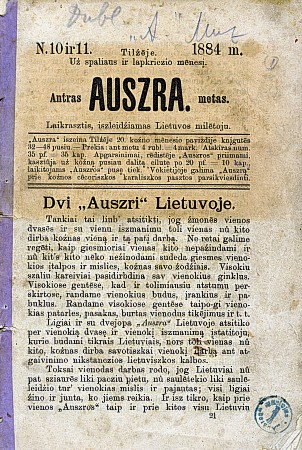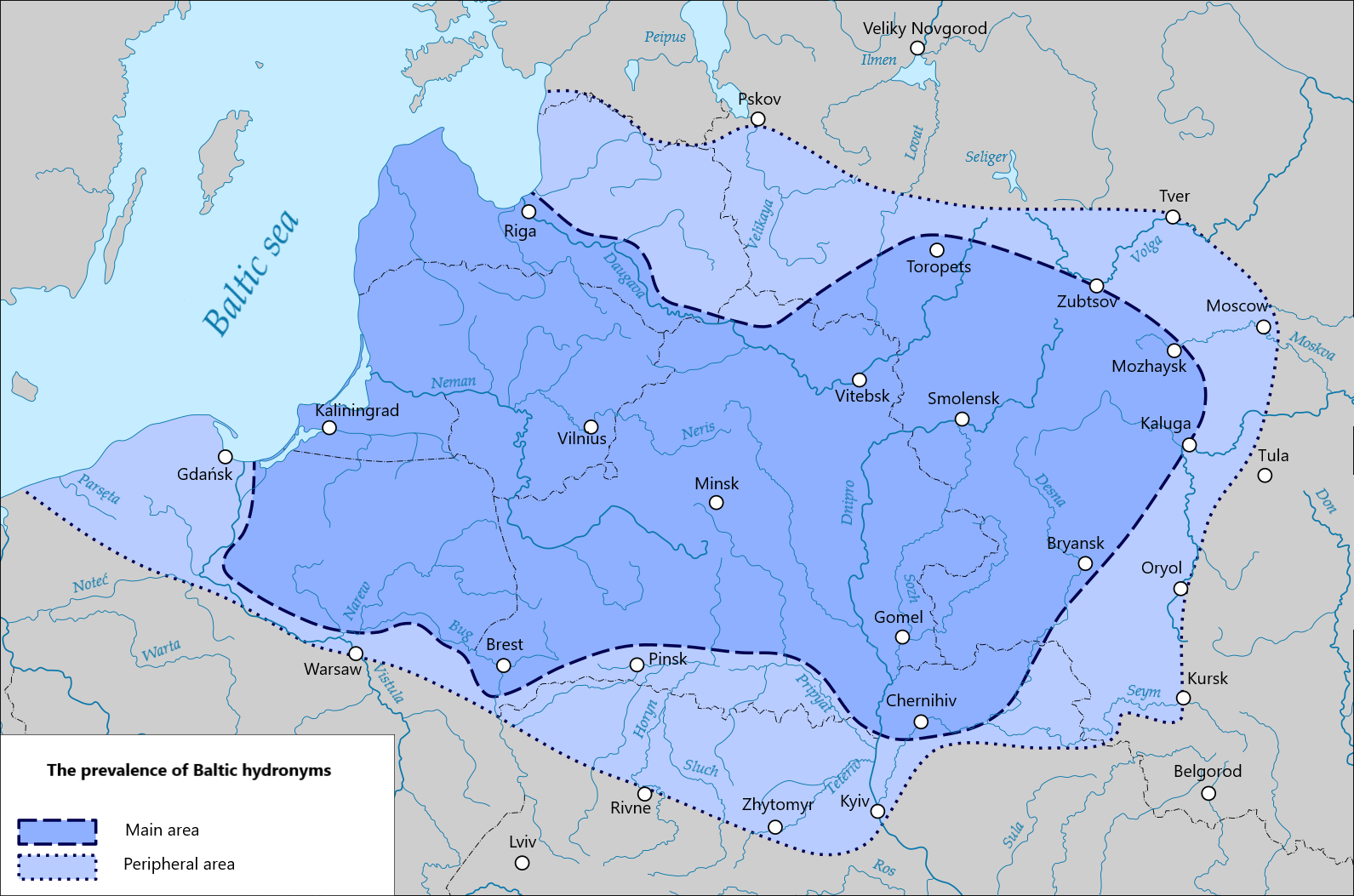|
҆viesa
''҆viesa'' or ''Szviesa'' (literally: ''The Light'') was a short-lived Lithuanian-language newspaper printed during the Lithuanian press ban in Tilsit (now Sovetsk) in German East Prussia and smuggled to Lithuania by the knygneŇ°iai. The monthly newspaper was published from August 1887 to August 1888 and from January to August 1890. 50- to 32-page newspaper had circulation of about 1,000. A special 72-page supplement was published in 1888. Influence of ''҆viesa'' was not very significant as it did not last and did not offer new ideas. After the first national Lithuanian newspaper ''AuŇ°ra'' ceased its publication due to financial difficulties, Lithuanian students in Moscow and young priests, disappointed by secular ''AuŇ°ra'', organized publication of ''҆viesa''. They sought to take leadership of the Lithuanian National Revival and propagate Catholic ideals. Edited by priest and Jonas KriauńćiŇęnas, ''҆viesa'' was geared towards a common villager and included many practical ... [...More Info...] [...Related Items...] OR: [Wikipedia] [Google] [Baidu] |
Jonas KriauńćiŇęnas
Jonas KriauńćiŇęnas (18 June 1864 ‚Äď 5 February 1941) was a Lithuanian activist during the Lithuanian National Revival mostly noted for editing and publishing Lithuanian periodicals ''Varpas'' and ''Ň™kininkas'' in 1891‚Äď1895 and ''Vilniaus Ňĺinios'' in 1905‚Äď1906. Born in Suvalkija, KriauńćiŇęnas studied medicine at Moscow University but did not complete his studies. In 1889, to avoid conscription to the Russian Army, he moved to Tilsit in East Prussia where he worked at printing presses. When Juozas Adomaitis-҆ernas fled East Prussia due to troubles with the police, KriauńćiŇęnas became responsible for editing and publishing ''Varpas'' and ''Ň™kininkas''. He attracted German police attention after he directed a Lithuanian historical play by the Birutńó Society in early 1895. He returned to Lithuania but was arrested and imprisoned by the Tsarist police in Kaunas and Saint Petersburg. For violating the Lithuanian press ban, he was sentenced to three years of exile in Talli ... [...More Info...] [...Related Items...] OR: [Wikipedia] [Google] [Baidu] |
KnygneŇ°iai
Lithuanian book smugglers or Lithuanian book carriers (, singular: ) smuggled Lithuanian language books printed in the Latin alphabet into Lithuanian-speaking areas of the Russian Empire, defying a ban on such materials in force from 1864 to 1904. In Lithuanian, ''knygneŇ°ys'' literally means "the one who carries books". Opposing imperial Russian authorities' efforts to replace the traditional Latin orthography with Cyrillic, and transporting printed matter from as far away as the United States to do so, the book smugglers became a symbol of Lithuanians' resistance to Russification. History After the Polish-Lithuanian insurrection of 1863, the Russian Imperial government intensified its efforts to Russify the Lithuanian population and alienate it from its historic roots, including the Roman Catholic faith, which had become widespread during the years of the Polish‚ÄďLithuanian Commonwealth. During the summer of 1863, Tsar Alexander II issued Temporary Rules for State Ju ... [...More Info...] [...Related Items...] OR: [Wikipedia] [Google] [Baidu] |
AuŇ°ra
''AuŇ°ra'' or ''Auszra'' (literally: ''dawn'') was the first national Lithuanian newspaper. The first issue was published in 1883, in Ragnit, East Prussia, Germany (newspaper credited it as ) East Prussia's ethnolinguistic part - Lithuania Minor. Later, it was published monthly in Tilsit (present-day Sovetsk). Even though only forty issues were published and the circulation did not exceed 1,000, it was a significant event as it marked the beginnings of the Lithuanian national rebirth that eventually resulted in an independent Lithuanian State (1918‚Äď1940). This period, between 1883 and 1904, when the Lithuanian press ban was enforced by Tsarist authorities, has been referred to as the ''AuŇ°ros gadynńó'' (the Dawn Period). The printing ceased in 1886 as a result of financial issues. History After the Russian authorities denied permission to publish a Lithuanian newspaper in Vilnius, Jonas ҆liŇępas proposed to publish it in East Prussia, Germany. However, he was perceived ... [...More Info...] [...Related Items...] OR: [Wikipedia] [Google] [Baidu] |
Pranas MaŇ°iotas
Pranas MaŇ°iotas (1863‚Äď1940) was a Lithuanian activist and educator best known as children's writer and translator. Born in Suvalkija to a family of Lithuanian farmers, MaŇ°iotas attended Marijampolńó Gymnasium and studied mathematics at Moscow University. As a Catholic, he could not obtain employment in Lithuania and took temporary clerical jobs in ŇĀomŇľa and Riga before becoming math teacher at the Riga Gymnasium in 1891. He held this job until World War I forced him to evacuate to Voronezh where he became director of the Lithuanian girls' and boys' gymnasiums. He returned to Lithuania in 1918 and started working on organizing the education system in the newly independent country. He was vice-minister at the Ministry of Education from 1919 to 1923. He then became director of the . He retired in 1929 and focused on literary work. He died on 14 September 1940. MaŇ°iotas was very active in Lithuanian cultural life. He joined and organized various Lithuanian societies, includ ... [...More Info...] [...Related Items...] OR: [Wikipedia] [Google] [Baidu] |
Petras Leonas
Petras Leonas (1864‚Äď1938) was a Lithuanian attorney and politician, the first Minister of Justice of the newly independent Lithuania in 1918. After graduating from Moscow University in 1889, Leonas held a government job at various courts in SuwaŇāki and Uzbekistan. He was fired after supporting the Constitutional Democratic Party (Kadets) during the Russian Revolution of 1905. He returned to Lithuania and took up private law practice, which he had for 32 years. In 1907, he was elected to the second short-lived State Duma of the Russian Empire. During World War I, Leonas retreated to Russia and was deputy chairman of the Lithuanian Society for the Relief of War Sufferers. In March 1917, he was one of the founders of the Democratic National Freedom League. He returned to newly independent Lithuania in 1918 and began working on drafting some of the fundamental legislation. He became the first Minister of Justice in November 1918 and the fourth Minister of Internal Affairs in Apri ... [...More Info...] [...Related Items...] OR: [Wikipedia] [Google] [Baidu] |
Lithuanian Language
Lithuanian (, ) is an East Baltic languages, East Baltic language belonging to the Baltic languages, Baltic branch of the Indo-European language family. It is the language of Lithuanians and the official language of Lithuania as well as one of the official languages of the European Union. There are approximately 2.8 million native Lithuanian speakers in Lithuania and about 1 million speakers elsewhere. Around half a million inhabitants of Lithuania of non-Lithuanian background speak Lithuanian daily as a second language. Lithuanian is closely related to neighbouring Latvian language, Latvian, though the two languages are not mutually intelligible. It is written in a Latin script. In some respects, some linguists consider it to be the most conservative (language), conservative of the existing Indo-European languages, retaining features of the Proto-Indo-European language that had disappeared through development from other descendant languages. History Among Indo-European languag ... [...More Info...] [...Related Items...] OR: [Wikipedia] [Google] [Baidu] |
Jonas Jablonskis
Jonas Jablonskis (; 30 December 1860, in Kubilńóliai, ҆akiai district ‚Äď 23 February 1930, in Kaunas) was a distinguished Lithuanian linguist and one of the founders of the standard Lithuanian language. He used the pseudonym ''RygiŇ°kiŇ≥ Jonas'', taken from the small town named RygiŇ°kiai where he spent his childhood. Biography After graduation from Marijampolńó Gymnasium, Jablonskis studied classical languages at the University of Moscow from 1881 to 1885. Amongst his professors were Filipp Fortunatov and Fedor Yevgenievich Korsh, both of whom were familiar with Lithuanian and encouraged their students to research his native language. Upon completing his studies in 1885, he was confronted with the Russification policy. As a Lithuanian Catholic, he was unable to find employment in Lithuania as a teacher. He was therefore constrained for a time to give private lessons, and to serve as a clerk in the court of Marijampolńó. In 1889, however, he succeeded in obtaining an appointmen ... [...More Info...] [...Related Items...] OR: [Wikipedia] [Google] [Baidu] |
Newspapers Established In 1887
A newspaper is a Periodical literature, periodical publication containing written News, information about current events and is often typed in black ink with a white or gray background. Newspapers can cover a wide variety of fields such as politics, business, sports, art, and science. They often include materials such as opinion columns, weather forecasts, reviews of local services, Obituary, obituaries, birth notices, crosswords, editorial cartoons, comic strips, and advice columns. Most newspapers are businesses, and they pay their expenses with a mixture of Subscription business model, subscription revenue, Newsagent's shop, newsstand sales, and advertising revenue. The journalism organizations that publish newspapers are themselves often Metonymy, metonymically called newspapers. Newspapers have traditionally been published Printing, in print (usually on cheap, low-grade paper called newsprint). However, today most newspapers are also Electronic publishing, published on webs ... [...More Info...] [...Related Items...] OR: [Wikipedia] [Google] [Baidu] |
Defunct Lithuanian-language Newspapers
{{Disambiguation ...
Defunct may refer to: * ''Defunct'' (video game), 2014 * Zombie process or defunct process, in Unix-like operating systems See also * * :Former entities * End-of-life product * Obsolescence Obsolescence is the process of becoming antiquated, out of date, old-fashioned, no longer in general use, or no longer useful, or the condition of being in such a state. When used in a biological sense, it means imperfect or rudimentary when comp ... [...More Info...] [...Related Items...] OR: [Wikipedia] [Google] [Baidu] |
Maironis
Maironis (born Jonas Mańćiulis, ; ‚Äď 28 June 1932) was a Lithuanians, Lithuanian Roman Catholic priest and the greatest and most-known Lithuanian poet, especially of the period of the Lithuanian press ban. He was called the Bard of Lithuanian National Revival (). Maironis was active in public life. However, the Lithuanian literary historian Juozas Brazaitis writes that Maironis was not. In his poetry, he expressed the national aspirations of the Lithuanian National Revival and was highly influential in Lithuanian society and poetry. The Maironian School of thought, school in Lithuanian literature was named after him. Life Early years Jonas Mańćiulis was born on in manor, , , in the former Grand Duchy of Lithuania, which was almost wholly annexed by the Russian Empire during the Partitions of Poland, Partitions of the Polish‚ÄďLithuanian Commonwealth. Maironis' parents were free peasants who maintained close relations with the polonized Lithuanian nobility. Such a social e ... [...More Info...] [...Related Items...] OR: [Wikipedia] [Google] [Baidu] |
Russian Empire
The Russian Empire was an empire that spanned most of northern Eurasia from its establishment in November 1721 until the proclamation of the Russian Republic in September 1917. At its height in the late 19th century, it covered about , roughly one-sixth of the world's landmass, making it the list of largest empires, third-largest empire in history, behind only the British Empire, British and Mongol Empire, Mongol empires. It also Russian colonization of North America, colonized Alaska between 1799 and 1867. The empire's 1897 census, the only one it conducted, found a population of 125.6 million with considerable ethnic, linguistic, religious, and socioeconomic diversity. From the 10th to 17th centuries, the Russians had been ruled by a noble class known as the boyars, above whom was the tsar, an absolute monarch. The groundwork of the Russian Empire was laid by Ivan III (), who greatly expanded his domain, established a centralized Russian national state, and secured inde ... [...More Info...] [...Related Items...] OR: [Wikipedia] [Google] [Baidu] |





